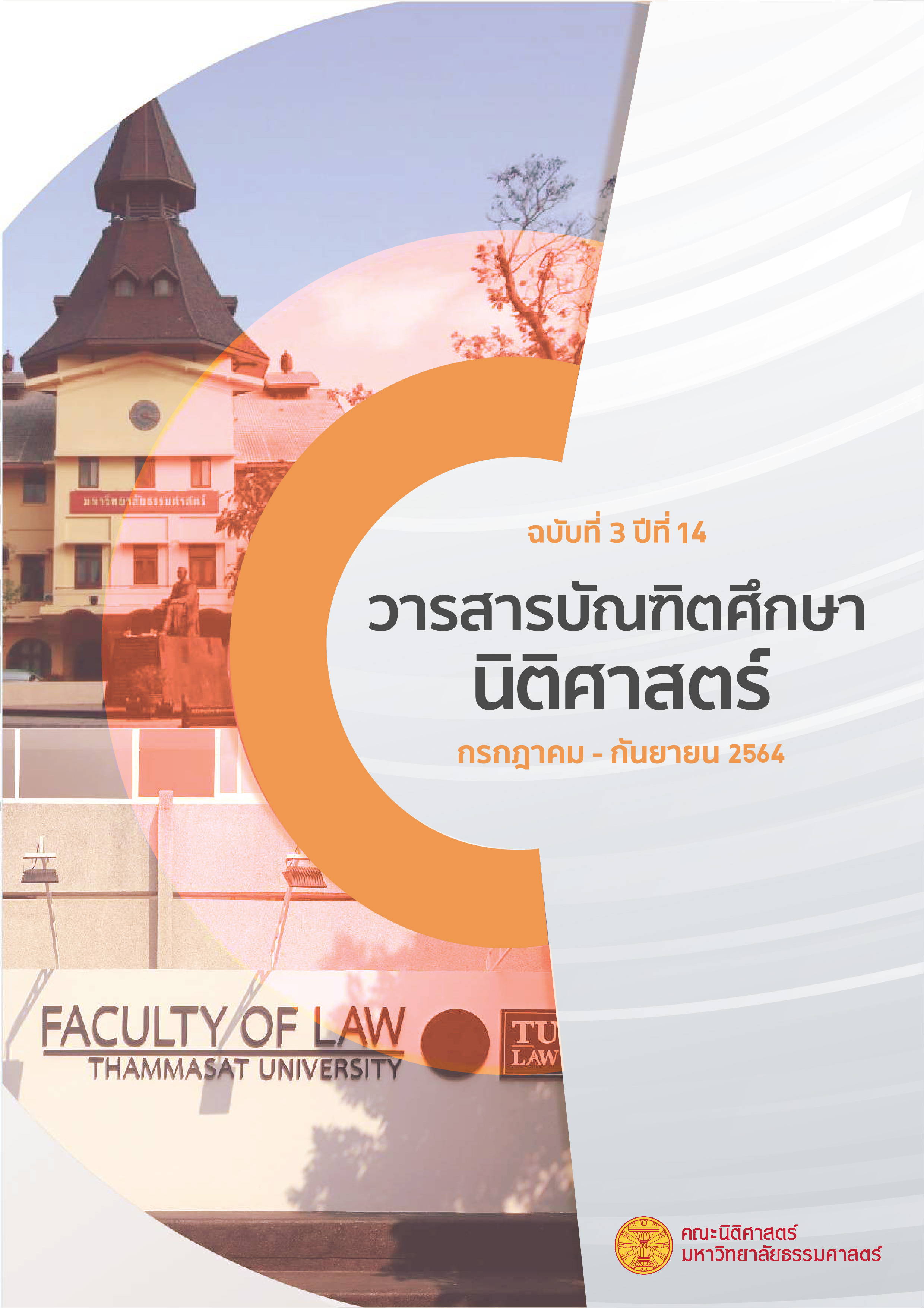ปัญหากฎหมายเกี่ยวกับการห้ามกรรมการค้าขายแข่งกับบริษัทจำกัด
Main Article Content
บทคัดย่อ
กรรมการบริษัทจำกัดมีบทบาทสำคัญในการบริหารกิจการของบริษัทแทนผู้ถือหุ้น กรรมการจึงมีฐานะเป็นผู้ที่ได้รับความไว้วางใจจากผู้ถือหุ้น (Fiduciary) ในขณะเดียวกัน กรรมการเป็นผู้ที่สามารถล่วงรู้ข้อมูลที่เป็นโอกาสทางธุรกิจของบริษัทได้จึงมีความเสี่ยงที่กรรมการจะนำข้อมูลของบริษัทดังกล่าวไปใช้ค้าขายแข่งกับบริษัทจำกัดซึ่งทำให้บริษัทเสียหายได้ ดังนั้น กรรมการจึงจำเป็นต้องมีหน้าที่ของผู้ที่ได้รับความไว้วางใจ (Fiduciary Duties) โดยกรรมการจะต้องจงรักภักดีและซื่อสัตย์ต่อบริษัทจำกัด (Duty of Loyalty) แม้ประเทศไทยจะมีกฎหมายที่กำหนดหน้าที่ดังกล่าวของกรรมการ โดยห้ามกรรมการค้าขายแข่งกับบริษัทจำกัด ซึ่งบัญญัติอยู่ในประมวลกฎหมายแพ่งและพาณิชย์บรรพ 3 เอกเทศสัญญา ลักษณะ 22 หุ้นส่วนและบริษัท หมวด 4 บริษัทจำกัด ส่วนที่ 3 วิธีจัดการบริษัทจำกัด แต่จากการศึกษาก็ยังคงพบข้อบกพร่องบางประการของกฎหมายว่าด้วยการห้ามกรรมการค้าขายแข่งกับบริษัทจำกัด ซึ่งมีบทบัญญัติบางตอนที่ไม่ชัดเจนในหน้าที่ของกรรมการบางประการ ซึ่งอาจก่อให้เกิดปัญหาการตีความได้ และมีข้อเท็จจริงบางเรื่องที่กฎหมายดังกล่าวบัญญัติไม่ครอบคลุมถึงซึ่งอาจทำให้เกิดช่องว่างทางกฎหมายได้ นอกจากนี้ บทกฎหมายในส่วนที่เกี่ยวกับสภาพบังคับทางกฎหมาย (sanction) เมื่อมีกรณีที่กรรมการฝ่าฝืนต่อหน้าที่นั้นยังไม่มีประสิทธิภาพเพียงพอที่จะปราบปรามการกระทำผิดของกรรมการได้ (inadequate deterrence) ดังนั้น บทความนี้จึงมุ่งศึกษาเรื่อง ปัญหากฎหมายเกี่ยวกับการห้ามกรรมการค้าขายแข่งกับบริษัทจำกัด โดยมีประเด็นปัญหากฎหมายทั้งหมด 5 ประการ ดังนี้
- ปัญหากรรมการเข้าไปเป็นกรรมการของบริษัทอื่นซึ่งประกอบกิจการอันมีสภาพเป็นอย่างเดียวกัน และเป็นการแข่งขันกับกิจการของบริษัทจำกัด
- ปัญหากรรมการประกอบกิจการไปเพื่อประโยชน์แก่บริษัทจำกัด แต่การประกอบกิจการนั้นกลับเข้าลักษณะที่กฎหมายกำหนดว่าเป็นการค้าขายแข่งกับบริษัท
- ปัญหาศาลไม่มีอำนาจสั่งให้กรรมการยุติค้าขายแข่งกับบริษัทจำกัด
- ปัญหาบริษัทจำกัดไม่มีสิทธิเรียกเอากำไรที่กรรมการหาได้ทั้งหมดจากการค้าขายแข่งกับบริษัท
- ปัญหาไม่มีกฎหมายห้ามอดีตกรรมการนำข้อมูลที่เป็นโอกาสทางธุรกิจที่อดีตกรรมการได้ล่วงรู้มาในขณะที่ยังดำรงตำแหน่งเป็นกรรมการไปใช้ค้าขายแข่งกับบริษัทจำกัด
จากการศึกษาค้นคว้าพบว่า ปัญหากฎหมายดังกล่าวควร ให้มีการวางแนวทางการตีความหรือชำระสะสางแก้ไขปรับปรุงบทบัญญัติว่าด้วยการห้ามกรรมการค้าขายแข่งกับบริษัทจำกัด โดยพิจารณาปรับใช้หลักการของกฎหมายประเทศซึ่งเป็นต้นแบบประมวลกฎหมายแพ่งและพาณิชย์ให้มีความเหมาะสมและเป็นธรรมกับการดำเนินธุรกิจของบริษัทในบริบทกฎหมายไทยต่อไป
Article Details
บทความหรือข้อความคิดเห็นใด ๆ ที่ปรากฏในวารสารบัณฑิตศึกษานิติศาสตร์เป็นความรับผิดชอบของผู้เขียนบทความโดยเฉพาะ คณะนิติศาสตร์ มหาวิทยาลัยธรรมศาสตร์ และกองบรรณาธิการไม่จำเป็นต้องเห็นด้วย
เอกสารอ้างอิง
ทิพย์ชนก รัตโนสถ. กฎหมายลักษณะห้างหุ้นส่วนและบริษัท. พิมพ์ครั้งที่ 3.กรุงเทพมหานคร : โรงพิมพ์เดือนตุลา, 2550.
ไพโรจน์ วายุภาพ. คำอธิบายประมวลกฎหมายแพ่งและพาณิชย์ว่าด้วยหนี้. พิมพ์ครั้งที่ 10.กรุงเทพมหานคร : สำนักอบรมศึกษากฎหมายแห่งเนติบัณฑิตยสภา, 2555
ภาสกร ชุณหอุไร. คำอธิบายประมวลกฎหมายแพ่งและพาณิชย์ เรียงมาตรา ว่าด้วยหุ้นส่วนและบริษัท (มาตรา 1012 ถึง 1273/4). กองทุนศาสตรจารย์จิตติ ติงศภัทิย์. กรุงเทพมหานคร : โรงพิมพ์เดือนตุลา, 2553.
สหธน รัตนไพจิตร. กฎหมายลักษณะห้างหุ้นส่วนบริษัท. พิมพ์ครั้งที่ 2. กรุงเทพมหานคร : สำนักพิมพ์วิญญูขน, 2558.
โสภณ รัตนากร. คำอธิบายประมวลกฎหมายแพ่งและพาณิชย์ : หุ้นส่วนบริษัท. พิมพ์ครั้งที่ 13. กรุงเทพมหานคร : สำนักพิมพ์นิติบรรณการ, 2556.
วิทยานิพนธ์
จุมพล แดงสกุล. “การนำหลักกฎหมายว่าด้วยความสัมพันธ์ในลักษณะ Fiduciary มาใช้บังคับในประเทศไทย.” วิทยานิพนธ์มหาบัณฑิต คณะนิติศาสตร์ มหาวิทยาลัยธรรมศาสตร์, 2551.
นาฏยา นมะหุต. “ปัญหาการบังคับใช้พระราชบัญญัติการดูแลผลประโยชน์ของคู่สัญญา พ.ศ. 2551: ศึกษากรณีการซื้อขายอสังหาริมทรัพย์ประเภทที่อยู่อาศัย.” วิทยานิพนธ์มหาบัณฑิต คณะนิติศาสตร์ มหาวิทยาลัยศรีปทุม, 2559.
ปิ่นอนงค์ พืชมงคล. “ปัญหากฎหมายเกี่ยวกับการควบรวมกิจการในการประกอบธุรกิจ.” วิทยานิพนธ์ปริญญามหาบัณฑิต คณะนิติศาสตร์ มหาวิทยาลัยศรีปทุม, 2559.
วิมล ธีระภาพพันธ์. “การตัดสินใจเพื่อเข้าครอบงำกิจการในตลาดหลักทรัพย์แห่งประเทศไทย และผลกระทบของการครอบงำกิจการต่อราคาหุ้น.” วิทยานิพนธ์มหาบัณฑิต คณะเศรษฐศาสตร์ มหาวิทยาลัยเชียงใหม่, 2537.
บทความ
ธรรมนิตย์ สุมันตกุล. “ค่าเสียหายเชิงลงโทษ (Punitive Damages).” สํานักงานคณะกรรมการกฤษฎีกา. (กุมภาพันธ์ 2558) : 2-3.
เอกสารประกอบการประชุม
ตรีขวัญ บุนนาค. “Merge & Acquisitions.” ในการประชุมทางวิชาการ เรื่อง Merge & Acquisitions ครั้งที่ 32. จัดโดยคณะบริหารธุรกิจ มหาวิทยาลัยเกษตรศาสตร์, 2537.
เอกสารอิเล็กทรอนิกส์
สำนักงานคณะกรรมการป้องกันและปราบปรามการทุจริตแห่งชาติ. “พระราชบัญญัติประกอบรัฐธรรมนูญว่าด้วยการป้องกันและปราบปรามการทุจริต พ.ศ. 2561 มาตรา 126 และ มาตรา 127 ห้ามเจ้าพนักงานของรัฐดำเนินกิจการที่เป็นการขัดกันระหว่างประโยชน์ส่วนบุคคลกับประโยชน์ส่วนรวม.” https://www.nacc.go.th, 30 เมษายน 2564.
ARTICLES
Hideki Kanda, Curtis J. Milhaupt. “Re-examining Legal Transplants: The Director's Fiduciary Duties in Japanese Corporate Law.” The American Journal of Comparative Law, 51, 4. (2003) : 896.
J. Mark Ramseyer, Masayuki Tamaruya. “Fiduciary Principles in Japanese Law.” Oxford Handbook of Fiduciary Law 935. (September 2017) : 4-5.
Michael Christie. “The Director’s Fiduciary Duties Not to Compete.” The Modern Law Review 55. (1992) : 506-507.
ELECTRONIC MEDIA
John Davies. “A Guide to Directors’ Responsibilities under the Companies Act 2006.” https://www.accaglobal.com/content/dam/acca/global/PDF-technical/business-law/tech-tp-cdd.pdf, February 22, 2021.
Pinsent Masons. “Remedies where there is a breach of directors' duties.” https://www.pinsentmasons.com/out-law/guides/remedies-where-there-is-a-breach-of-directors-duties, March 1, 2021.


